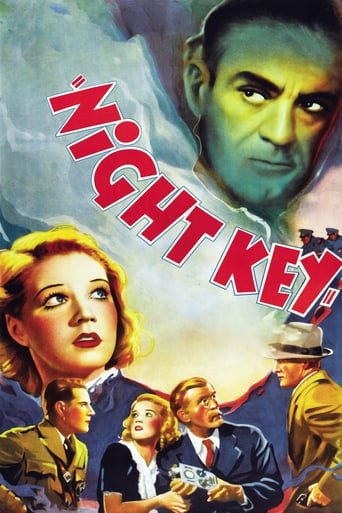lugonian
NIGHT KEY (Universal, 1937), directed by Lloyd Corrigan, stars horror film icon Boris Karloff in a sort of change-of-pace project from his then current trend. Not exactly playing a night watchman with a skeleton key to get into every room in a warehouse where he works, but a kindly-old inventor with a device known as "The Night Key." Having recently played a scientist whose invention has him going on a murderous rampage in THE INVISIBLE RAY (1935), for NIGHT KEY, Karloff brings a new dimension to inventor/scientist, which, up to that time, typically one who becomes insane through the use of one of his own experiments. Here he's a middle-aged father figure, frail in appearance but strong in his actions which marked a new beginning for Karloff with similar roles to follow. Now back to NIGHT KEY.In an original story by William Pierce set in New York City, the plot introduces Stephen (or Steven) Ranger (Samuel S. Hinds), president of the Ranger Protective Agency, celebrating his twenty years of successful business serving alarm systems for banks and businesses. Dave Mallory (Boris Karloff), his former partner who actually invented these devises years ago, has never received credit nor royalties for his work. Now living in a tenement apartment with his adult daughter, Joan (Jean Rogers), a cashier for Coast to Coast Restaurant, Dave, having worked fifteen years on his latest security system, is slowly going blind. Fearing the new and improved invention might put him out of business, Ranger agrees to talk financial terms with Dave and market the product. Willing to forget Ranger's past misdeeds, Dave entrusts him with the invention in exchange with $500 advance royalty. Once the contracts are signed, Dave soon learns he's been tricked again, with Ranger having no intention of marketing the product after all. After Dave releases the soon to be arrested thief,"Petty Louie" (Hobart Cavanaugh), from Ranger's detention room with his night key, the two men team together through a series of break-ins to ruin Ranger's business, all leaving a note signed by "Night Key" that reads, "What I create, I can destroy." All goes well as planned until mobsters headed by The Kid (Alan Baxter) force Dave and Louie to join in their crime wave. As Dave's daughter awaits to hear from her father and his undisclosed whereabouts, she finds herself being trailed by Jimmy Travers (Warren Hull), one of Ranger's security guards who takes a special interest in this case.Often classified as a horror film due to the Karloff name and stock music lifted from Universal's own "Werewolf of London" (1935) on certain occasions, NIGHT KEY had formerly been linked along other Universal horror titles ("Dracula," "Frankenstein," "The Mummy," "The Wolf Man") whenever shown on broadcast television on Fright Night or Shock Theater festivals back in the sixties and seventies, and briefly on New York City's "Cinema 13 Horror" in 1981. Regardless, NIGHT KEY is actually a quaint little "from science fiction to crime thriller" stories that offers Karloff the opportunity of becoming more than a creepy character or man of evil tendencies as indicated in THE BLACK CAT (1934). In NIGHT KEY, Karloff's performance of the frail, white haired old man with bushy mustache, helpless without his glasses, is quite believable. Aside from the secondary performances by the blonde Jean Rogers (in a physical manner of fellow blonde actress, Mary Carlisle) and Warren Hull (billed as J. Warren Hull), honorable mention goes to the long forgotten Alan Baxter whose distinctive voice and mannerism best suited for gangster leader, the same type he enacted in his debut film, MARY BURNS, FUGITIVE (Paramount, 1935) starring Sylvia Sidney. Interestingly, in spite of Baxter's unique personality, he never ranked among Hollywood's legendary tough guy types of James Cagney, Humphrey Bogart or even Alan Ladd. While Hobart Cavanaugh often appeared in minor bits, NIGHT KEY is one of those rare cases next to I COVER THE WATERFRONT (United Artists, 1933) where he's gets the most out of his supporting stature. Others featured in the cast are: David Oliver (Mike); Ward Bond ("Fingers'); Frank Reicher (Carl); and Edwin Maxwell (Lawyer Kruger). Henry Armetta and Nina Campini as an Italian couple offer some amusing moments.Though some might find NIGHT KEY disappointing for lack of horror content, it's actually quite good for its standard, fast-paced second feature material. It's become available on DVD double featured along with Karloff's medieval feature, "Tower of London" (1939), though prints provided happen to be taken from 1940s reissue from Real-Art Pictures. Because of its science fiction theme, NIGHT KEY would be best suited as a double-bill with Karloff's THE INVISIBLE RAY (1935) on the flip side instead. (**1/2 keys)
doctorsmoothlove
This is Karloff's least memorable movie (since he isn't the antagonist). However, Karloff does portray the hapless inventor well. The only fault I see is that the film didn't make use of his individual talent as well as it could have. Any person could have been Mr. Mallory. Nevertheless, "Night Key" is a pleasant film because of its just funny dialog and realistic acting. I recommend it not only because it offers a change of pace for Karloff fans but also because its noir elements make it still entertaining. This film is surprisingly memorable not just because of the creative story but because of the amusing dialog. For example, when Ranger arrests Petty Louie he laments that the 10,000th person that his alarm has helped him arrest wasn't a big-name criminal. Louie apologizes and says that he was too shy to have been a more loathsome criminal. Also, Louie's accent and his constant recognizance of Mallory as his "boss" if very amusing just by how out of place the dialog feels. Even though Karloff gets the credit as the popular actor, Cavanaugh has the best performance. Mallory could have been portrayed by any actor.




